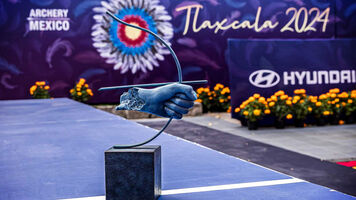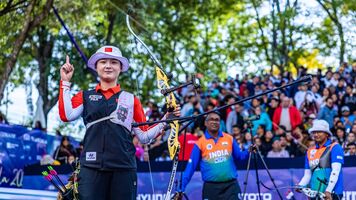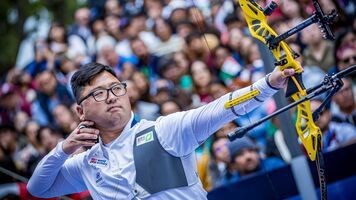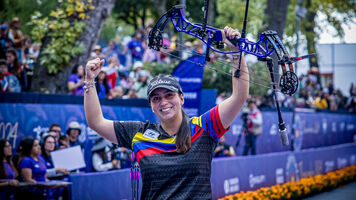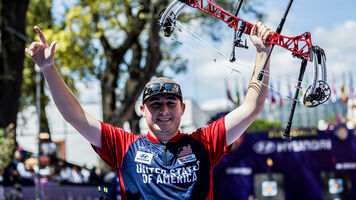An San: The art of not losing
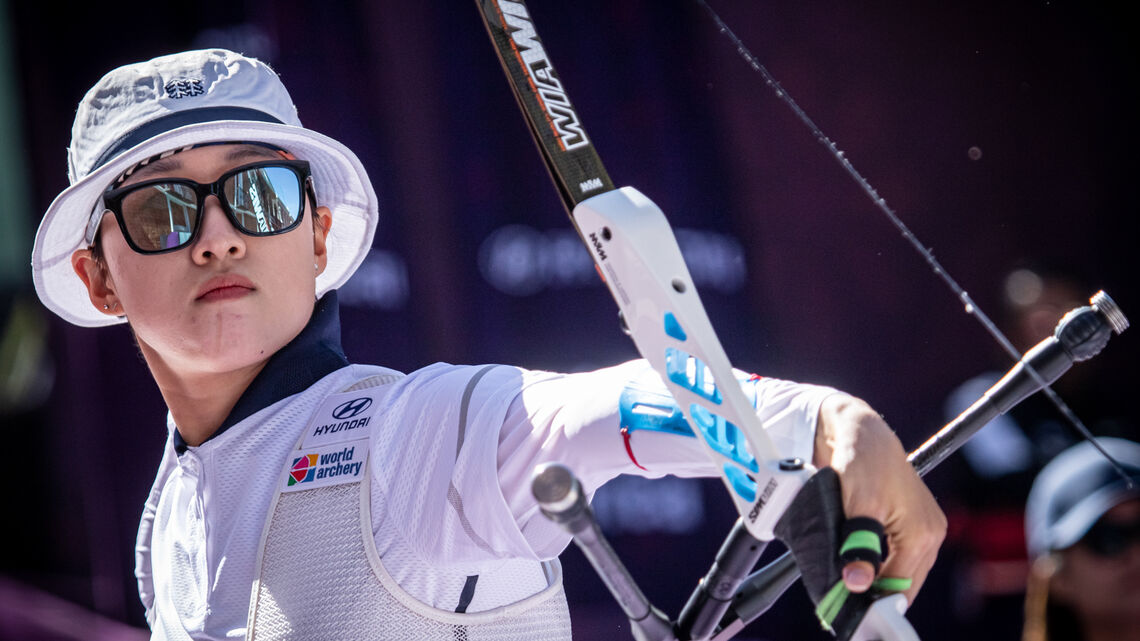
Recurve day at the 2022 Hyundai Archery World Cup Final proved memorable for all kinds of reasons – some good, some bad, some almost out of this world.
Perhaps the biggest contributor to the day’s action was the crowd. Sold out, loud, enthusiastic and so keen to meet their heroes that medallists were signing autographs for over an hour after a session was complete – and even needed police escort back to their hotels!
Frequent attendees said it was the greatest Archery World Cup Final they had ever been to.
When a city warmly embraces the sport as Tlaxcala did, it leaves an impression – and the spectacular, atmospheric city-square arena, replete with the host country’s traditional colourful details, had much to do with that. The archers emerged from the government palace to everything a season-ending spectacle should be. Tlaxcala was proud, and it showed.
Both Olympic Champions were finally in attendance.
An San famously skipped the Hyundai Archery World Cup Final last year, having received an Olympic wildcard, after attending the Hyundai World Archery Championships only days before in Yankton. She claimed, obliquely, that this year was the first time she was able to attend the event and that she didn’t ‘have the chance’ in 2019 and 2021.
(She was withdrawn by her university team in ’19 – in favour of a major domestic competition – and said she didn’t deserve the spot in ’21.)
The crowd – and the archery world – was certainly pleased to finally see her on the stage. She battled hard. Never looking dominant, as she has in moments past, but always doing just enough. Afterwards, An San said that her arrows “didn’t hit the target as I [sic] wanted”.
But somehow, it was enough.
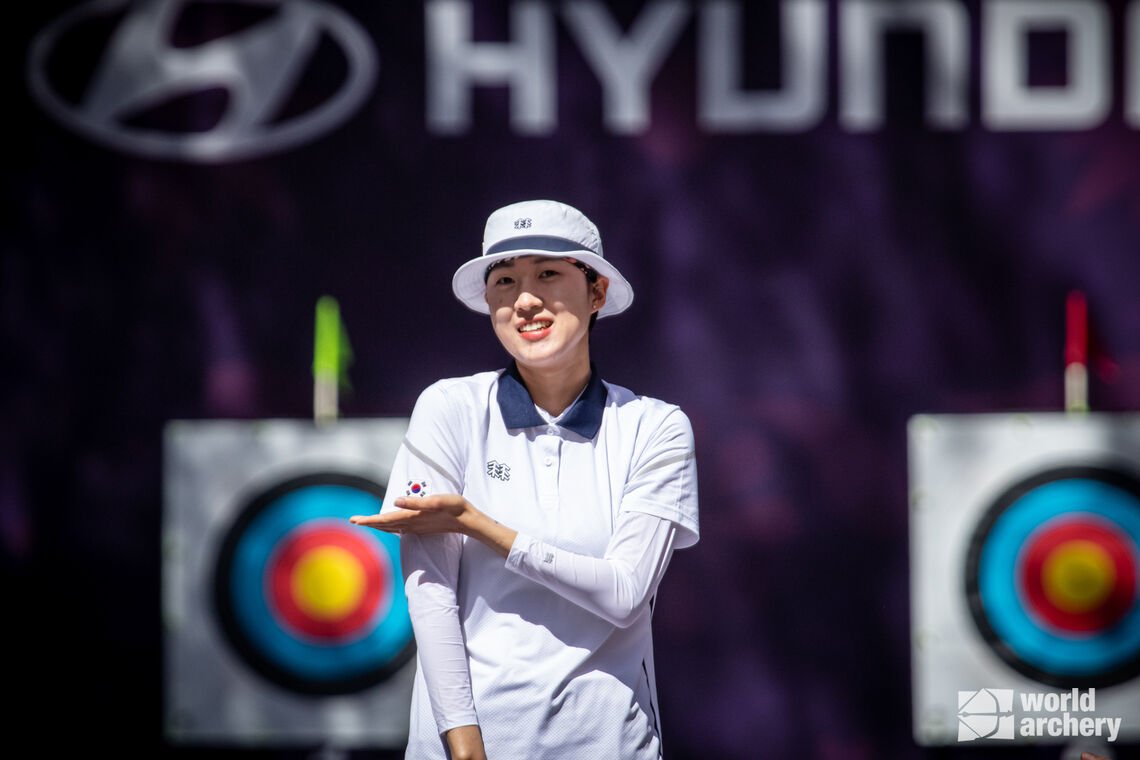
There is a portion of archery matchplay that is about not losing, rather than winning. Many of the archers who took to the stage in Tlaxcala know what that means.
Great Britain’s Bryony Pitman, a surprise qualifier after winning the season opener in Antalya, was first up against Korean former Hyundai Archery World Cup Champion Choi Misun. Pitman made the last 16 at the Olympics in Tokyo by staying calm against higher-ranked opponents – who must have felt more pressure – and exploiting her opportunities.
She must have wished she had found that extra gear again, in a match strewn with poor arrows from Choi. Pitman had chances.
The finals field looked special on television – but it was also challenging, with the trees and looming building casting impressive shadows and a stark contrast against the bright sun. Some recurve archers found it tough, the all-weather target faces reflecting a lot of light.
Katharina Bauer of Germany, with her silver bow, seemed visibly distracted by the glare, and soon sank ignominiously.
Bright yellow butterflies appeared on the field, too – testing distraction training to the limit.
An San’s first match, against the less well-known Kuo Tzu Ying set a pattern. The Korean archer would shoot solidly but unremarkably, trail the advantage but, ultimately, win. She only just out-shot Kuo, 6-4, and then lucked out against her Chinese Taipei teammate, Peng Chia-Mao, in the semifinal as she trailed, 4-2.
As the Olympic Champion looked increasingly uncomfortable, Peng lost her cool. Two eights sank the boat and An San clung on to win.
Peng was distraught. She knew. And she immediately shot again – brilliantly – to easily take a spot on the podium from home favourite Alejandra Valencia, who didn’t really show up to her own party. The final, meanwhile, would be all-Korea, the stage set for coaches to eschew scopes in the box and the two women turning up in ‘home’ and ‘away’ kit.
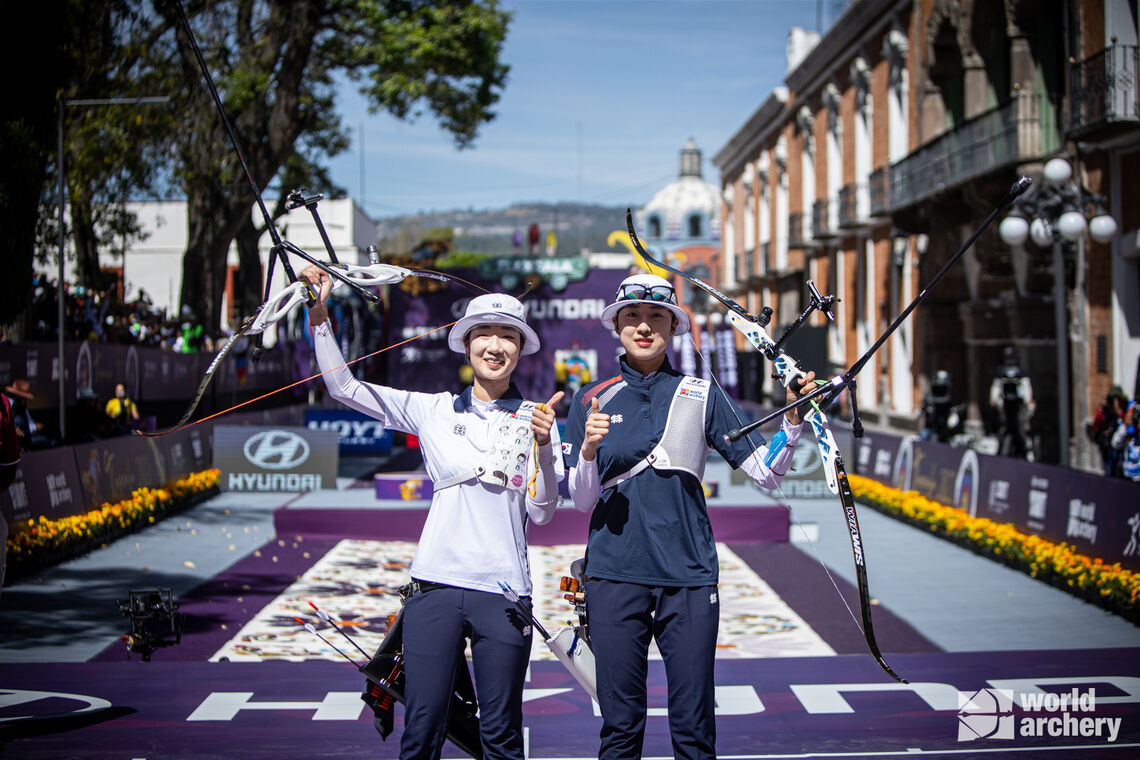
Misun opened the title bout with a strong 30. She seemed fully in command, as a now-familiar pained look of bafflement spread across An San’s face – and hung around for the rest of the match.
Choi, who won the last time this event was held in Mexico in 2015, somehow shipped a seven in the second end, and then an eight in the fourth. Neither shot made much sense. And neither did the fact that An San had, somehow, clung on to level the match with just three arrows left to shoot.
She pulled a 29 out of the hat in the last to win – and looked almost embarrassed.
An San knew it wasn’t even close to what she could do. But she had won. Her matches had pivoted around one – or two – bad arrows. She had looked far from indomitable. Her opponents must have been wondering what might have been. The Olympic Champion had shot, consistently, enough – and that proved just enough.
A couple of hours later during the recurve men’s session, it was clear that ‘just enough’ would no longer cut it.
Kim Woojin was in town and ready to party. Fired up by apparently winning the Korean national championships last week – against nosebleed levels of competition – the three-time Hyundai Archery World Cup Champion had a wry grin on his face from the moment he walked on stage. In his eighth appearance at the season finale, and the first as a father after his son was born during Medellin, he would produce perhaps the most remarkable performance of his career.
Against Jesus Flores, Woojin shot three perfect sets – his back seven arrows all hitting the tiny X-ring – to win his quarterfinal. It was murder.
From that moment on, there was no doubt who was leaving with the title. Brady Ellison never looked in contention, his arrows wandering right, and Marcus D’Almeida couldn’t quite find the magic to push out second seed Miguel Alvarino. Kim Je Deok was finding the middle but took just a single set point of Woojin, who dropped just one of 12 arrows out of the 10 to canter through their semifinal.
The grin was getting wider.
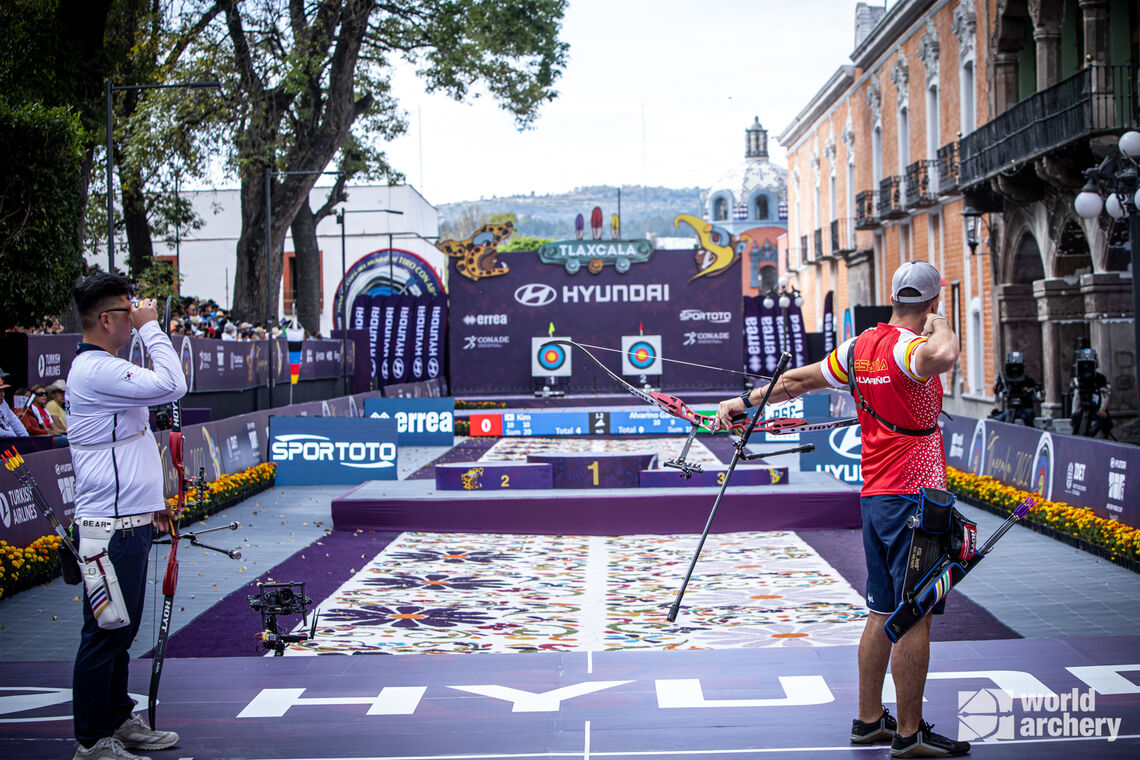
The recurve men’s final between Woojin and Miguel turned out to be one of the least remarkable matches of the day, perhaps because the Korean archer was only exceptional – not ridiculous.
Some have described Kim Woojin as the most talented archer of all time. This may or may not be true, but in Tlaxcala he performed with the style and brio of an historic champion. He was, without question, the best recurve archer on the stage – and has been, for much of this season.
In a pre-match preview, he said that “performing well at the World Cup Final would show to archers around the world that, ‘ah, Kim Woojin is still really incredible’”. A characteristic matter-of-fact statement and a rather un-Korean bit of carnival barking. Tlaxcala felt like a parade – an exhibition performance – towards his fourth circuit trophy. But it’s not the title that the three-time World Archery Champion really wants.
The 2024 Olympics are just two years away. Has Woojin finally got what is needed?
Perhaps he should look to his teammate – An San – to make sure.
The top qualifier at the Games in Rio in 2016, Woojin was unceremoniously dropped in the second round by giant-killer Riau Salsabilla who did… just enough, shooting the point more he needed each time he needed to win a set.
Seeded fourth last summer in Tokyo, at his second Olympics, Kim dominated the early rounds and, on the morning of the last day of competition – men’s finals day – opened proceedings with a perfect 90-point match to beat Malaysia’s Khairul Anuar Mohamad. This was going to be it. Woojin was in form. It was going to be his day.
Until it wasn’t.
Tied with Chinese Taipei’s Tang Chih-Chun after four sets of their quarterfinal, Woojin didn’t need much to win it. He just needed enough. Instead, he opened the fifth set with an eight, the pressure on Tang lifted and the archer from Taipei would ultimately advance (and finish a frustrating fourth).
Kim Woojin can win. An San can win.
But An San has a wonderful ability, as well, not to lose.






